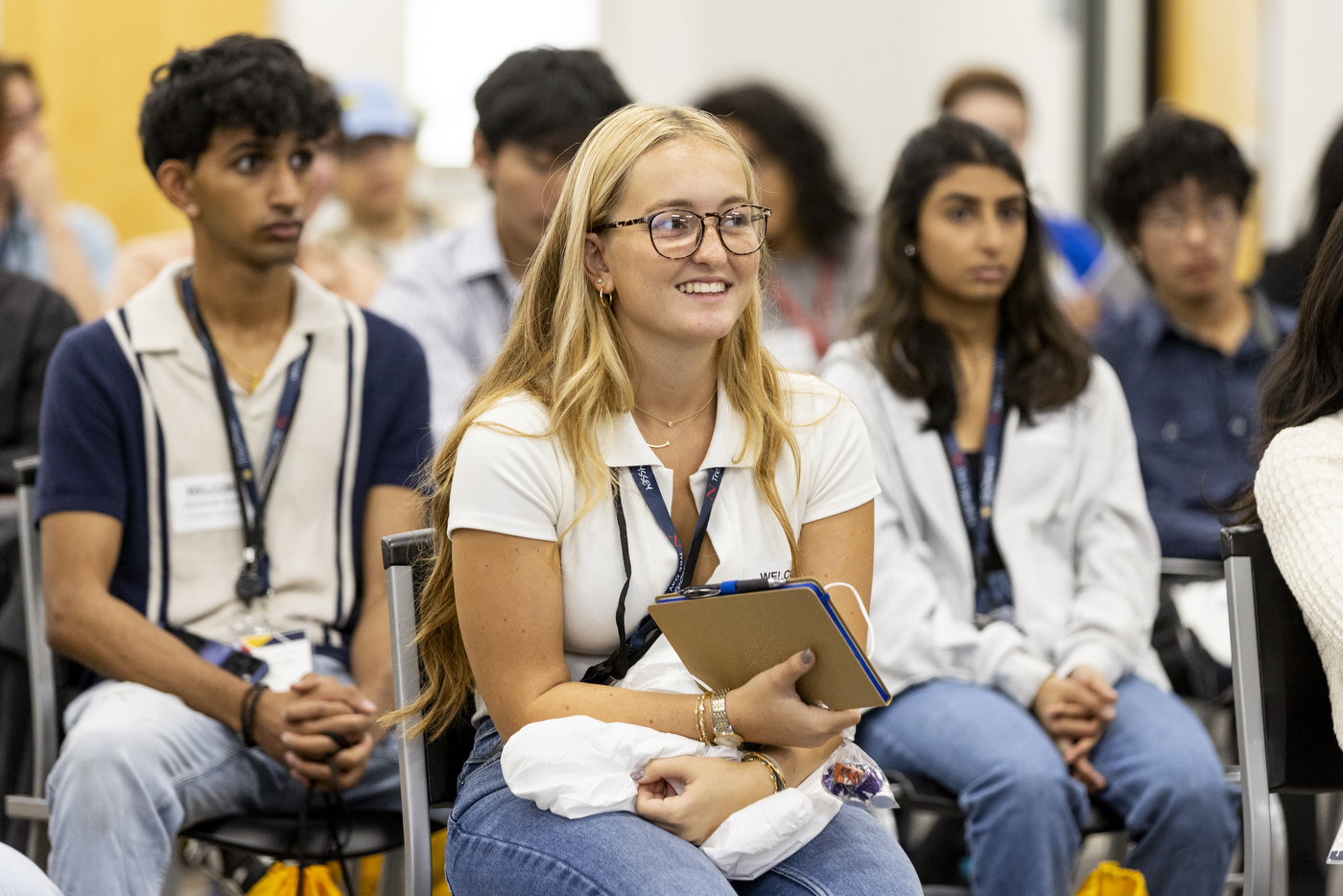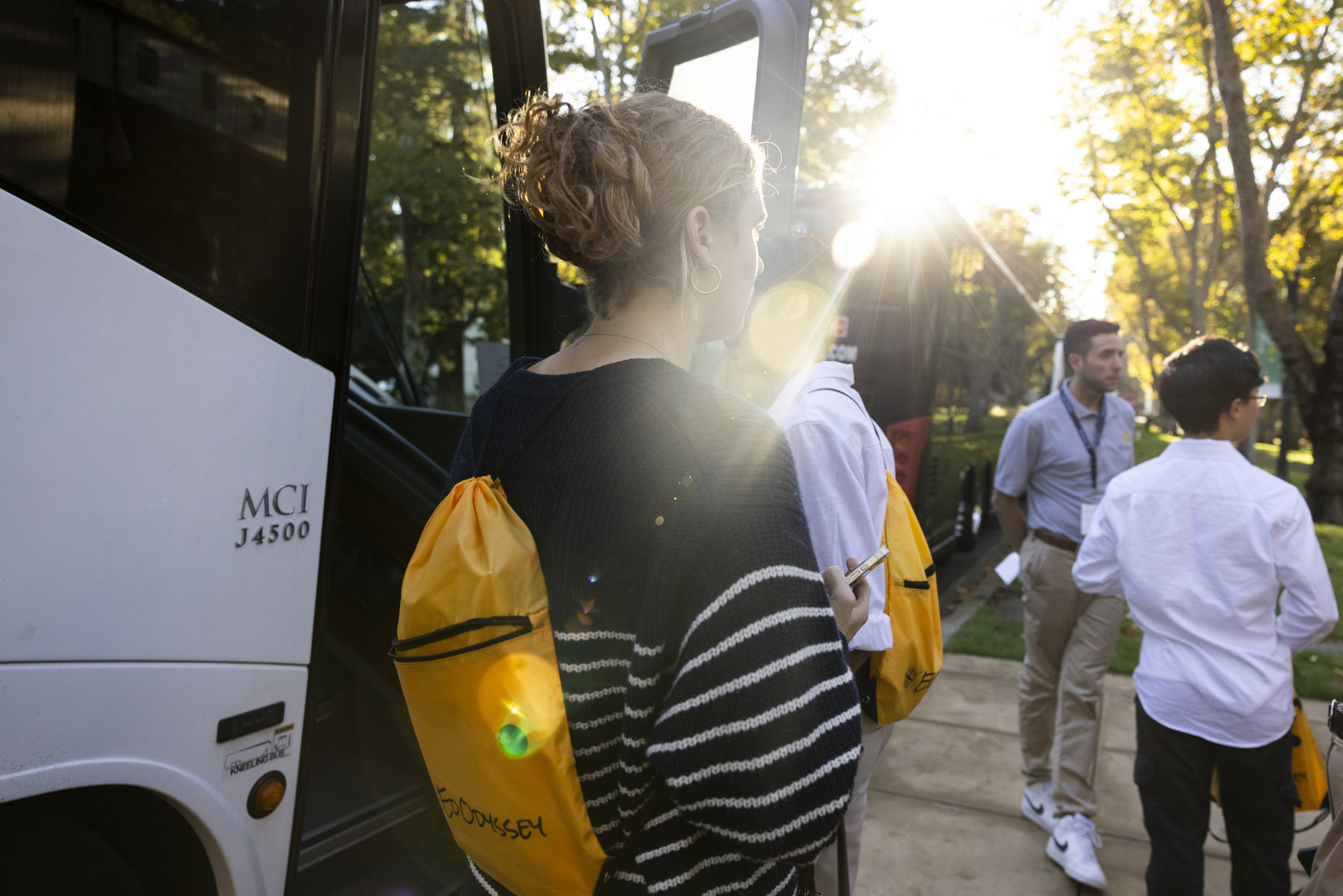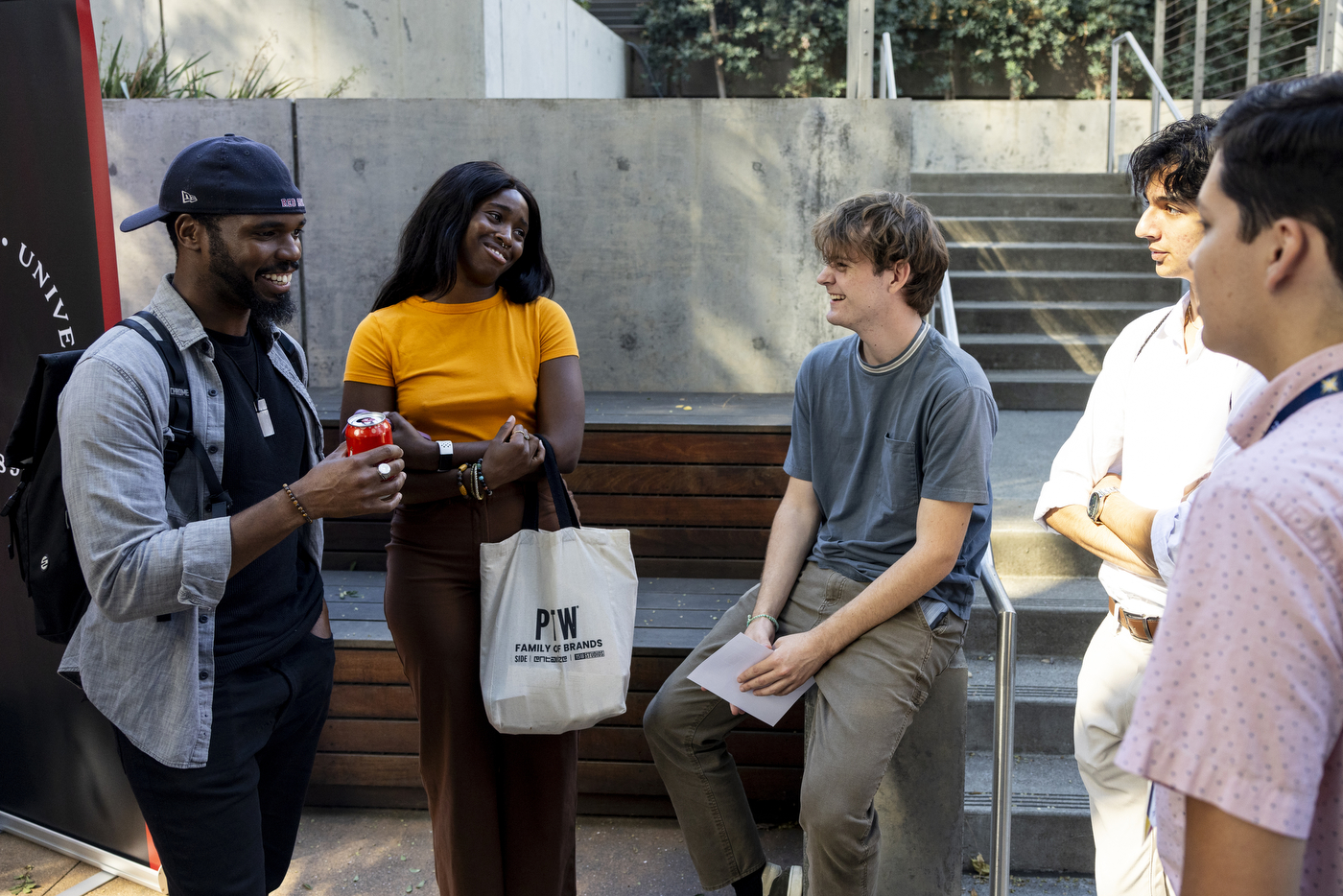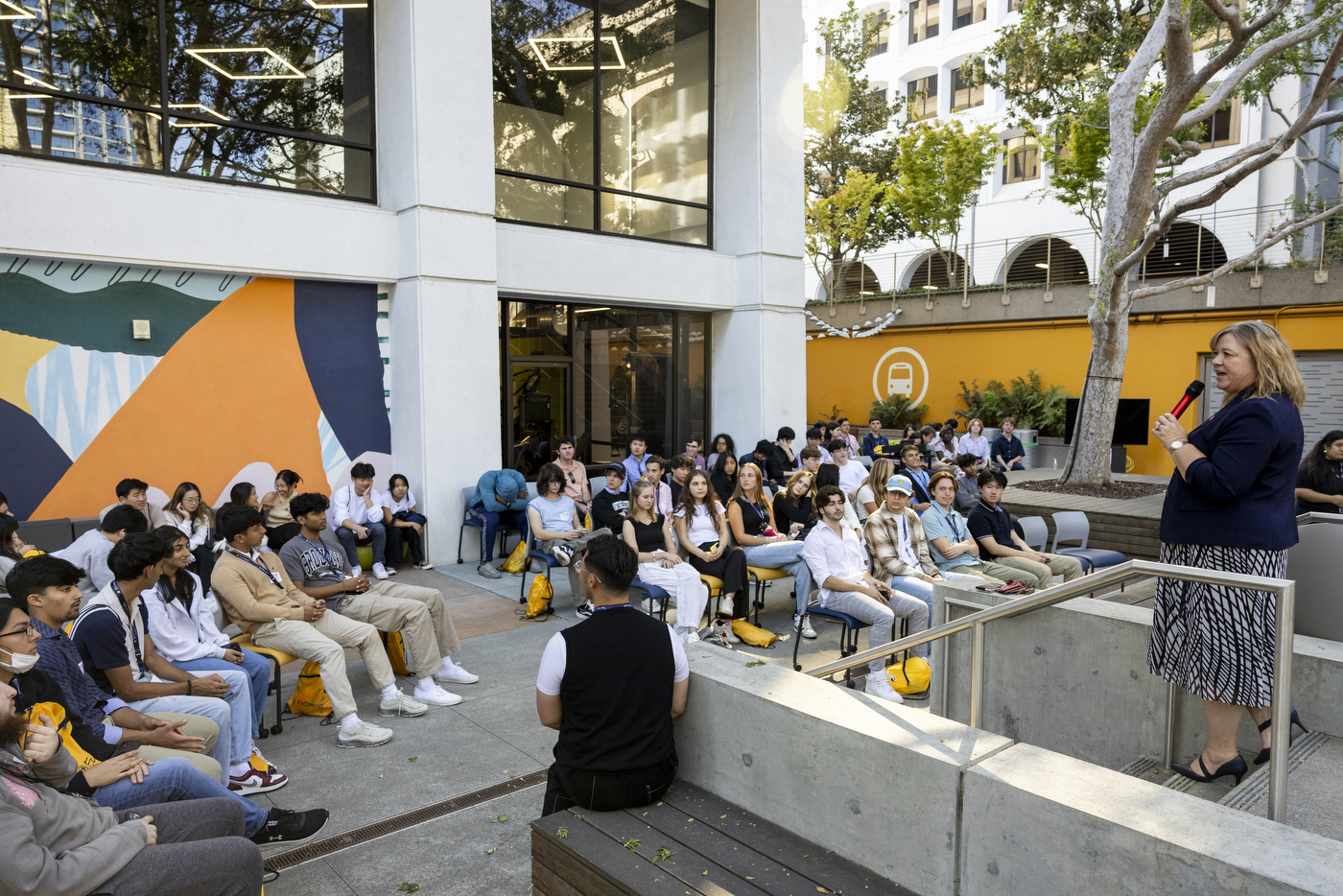Oakland Launches Experiential Entrepreneurship Program with Visits to Bay Area Companies
Northeastern University’s Oakland campus launched a new Experiential Entrepreneurship program where students visit Bay Area companies like Google and PayPal to gain real-world experience and explore career paths.
This article originally appeared on Northeastern Global News. It was published by Cynthia McCormick Hibbert and Vickie Jean DeHamer. Main photo: Northeastern students from the Oakland campus visit Onto Innovations in Milpitas, California, during the Experiential Entrepreneurship program. Photo by Ruby Wallau for Northeastern University
At Google, PayPal and beyond, Oakland students receive real-world lessons about Bay Area experiential learning opportunities
OAKLAND, Calif. — First-year Northeastern University student Joel Brook doesn’t usually don a white full-body coverall for his studies on the Oakland campus.
But Wednesday was no ordinary day. Instead of attending class, Brook and hundreds of other students headed for Bay Area workplaces as part of the university’s new Experiential Entrepreneurship program.
While some students headed to Google, the Oakland Zoo or other locations, Brook headed to Onto Innovation, a semiconductor equipment manufacturer in Milpitas, California, a suburb of San Jose.
There, he got a real-world lesson in the importance of keeping the semiconductor manufacturing space pristine.
“Those machines are so precise that even if a small speck of dust gets in them it can completely mess up the readings,” said Brook, a Boston resident studying on Northeastern’s Oakland campus. “You have to try to minimize as much as you can any dust or bacteria” from getting into the room.
 |  |
 |  |
Above, Dawn Girardelli, interim regional dean of the Silicon Valley campus, speaks with Northeastern students during the Experiential Entrepreneurship program. Top, students visit the Oakland Zoo, board a bus to leave campus, and listen to graduates CJ Paillant and Kristine Umeh. Photos by Ruby Wallau for Northeastern University
For Brook, the day was an eye-opener.
“I like being able to speak to people who actually work in the industry,” he said. “Being able to talk to them and see what they’re doing and how they’re doing it is really inspiring.”
Northeastern President Joseph E. Aoun helped kick off the Experiential Entrepreneurship program on Tuesday.
During the two-day program, students in Oakland alternated between spending a day on campus — hearing speakers from private industry and the public sector, and working on their own solutions to real-world problems — and visiting 31 worksites ranging from small to expansive.
‘Curiosity and a willingness to explore new horizons’
The participating businesses were just as happy to meet the students.
“Northeastern students exhibited several commendable qualities,” said Voleine Amilcar, director of marketing and communications for Berkeley Repertory Theatre, an award-winning nonprofit that hosted students for backstage tours and panels. “They possess curiosity and a willingness to explore new horizons, and some even expressed a genuine passion for the arts.”
Amilcar echoed the virtues of experiential learning, not just for the students’ benefit, but for business and community leaders looking to employ the next generation. It’s a win-win situation.
“It empowers students to apply classroom knowledge to real-world situations, equipping them with practical skills, problem-solving abilities, and a deeper understanding of various career paths,” she said. “For Berkeley Rep, the value of experiential learning lies in the opportunity to connect and engage with the next generation of artists and professionals, contributing to the continued growth and vitality of the arts community.”
First-year computer science and biology student Aarushi Gupta was impressed by Berkeley Rep’s commitment to its mission of championing the arts.
“Berkeley Rep seemed so invested in their company,” she said, noting that she got a lot of inspiration from the visit even though it didn’t directly apply to what she was studying.
Google engineers offer career advice
At Google’s spacious Mountain View’s visitor center, software engineer Grace Vesom told students to “make connections.”
She also told students to “be memorable somehow” and to fearlessly “take up space.”
Student Advait Dharampal said he appreciated hearing about the different career paths taken by Vesom and her Google colleague David Rendleman, as well as advice from software engineer Kristine Umeh.
Umeh, a double Husky who also studied Chinese music, inspired Dharampal, a computer science major, to pick an interesting minor.
“How much interdisciplinary work she did resonated with me a lot,” Dharampal said.
Umeh said the opportunity to advise current students about how to best position themselves for a successful future was a chance to use her experience to help others.
Umeh told students they need to develop soft skills such as teamwork and holding up under pressure as well as to cultivate technical skills.
“I would do at least one dialogue (of civilizations) or study abroad,” Umeh said. “This is basically a first introduction to a cross-functional team.”
I like being able to speak to people who actually work in the industry. Being able to talk to them and see what they’re doing and how they’re doing it is really inspiring.
Joel Brook, a Boston resident studying on Northeastern’s Oakland campus
What’s the company culture at PayPal?
When envisioning their perfect careers, not many students fantasize about sitting at a desk in an office. But they need a little help understanding what the alternative might look like.
Jahanavi Sinha, a first-year computer science and economics major, visited PayPal and returned to campus with a clearer picture of its company culture, which was decidedly “anti-cubicle,” something she wouldn’t have known had she not seen it for herself.
“PayPal was focused on collaboration and how working together with people is the key to success,” Sinha said. “I noticed all the shared spaces around campus — not the typical ‘cubicle culture.’”
Sinha appreciated Northeastern’s experiential learning model. It’s something that drew her to the Oakland campus.
“I have a sister and she’s a senior in college,” Sinha said. “She definitely has not had the physical experience of her college letting her go to a company and enter a building to see what it’s like.”
Read full story at Northeastern Global News